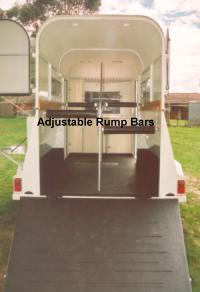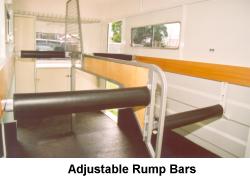|
|
|
|
|
|||||
 |
||||||||
 |
TRAVEL SICKNESS | |||||||
Floating can be
very stressful for horses, particularly if they are nervy and highly strung by nature.
Weather conditions, the time of day and the length of journey are all factors which must
be taken into account.The major risk involved in
transporting horses over the long distances that are often part of living in Australia, is
that of travel sickness. If a horse suffers from travel sickness, and is left untreated,
complications may arise and your horse could die! The best safeguard is awareness
of the likely causes and travel management that will
minimise the risk. Recognising the early signs and prompt
veterinary attention if early signs are detected.
The risk of travel sickness can greatly
reduced by minimising the stress that floating creates. Stress can be a pre-cursor
to travel sickness, which may develop into a chest infection or worse, life threatening
pleuopheumonia.
STEPS TO MINIMISE TRAVEL STRESS Do not put horses straight into the float straight after exercise, give them at least 15 minutes (if possible, longer) to cool off. If the horse has had really strenuous exercise such as a one day event or a race, more time would be a wise precaution. In very hot weather try to plan your day to travel in the cool of the morning and home again in the evening, avoiding the hottest part of the day. From midday to mid afternoon the float is sure to heat up and become uncomfortable. Do not tie the horses head on a short lead . When securing your horse in the float or truck, tie him so that he can lower his head and clear airways, throat etc. Be careful to make sure that there is nothing protruding that will cause him danger, as he lifts his head again. Avoid tying horses up high to a ring attached to the top of the float, say near a hay net, as this is a major contributing factor to travel sickness, particularly on a long trip. Have feed or hay secured in the float at chest height but make sure that he will not get tangled up in hay nets and panic.Unless it is very cold, be sure to have the float well ventilated, opening the top ventilation hatches or side windows. Clean fresh air is very important. Make sure that your car does not give off excessive exhaust fumes. This can increase the risk of chest infection, particularly if the horse breathes in impurities for quite a long time. Be sure to stop every 3 or so hours, unload the horse and let him stretch his legs, move about and also have a pick of grass. If it is hot, be sure to park the car and float in a shady place so that you and your horse do not have to get back into ‘an oven’. In extremely hot weather, this rest time can be used to sponge down your horse with cool water, this will help to stabilise his body temperature (in very hot conditions, about half a tea cup of cooling gel preparation in the water will provide extra benefit) . Offer him a drink (best to carry his favourite molasses water in a container). Getting his head down to eat grass will give him the chance to cough etc. and clear his throat and airway. Do not neglect this rest time as you will greatly increase the risk of travel sickness, if you do. Even if you cannot unload horses, stop ... and give the horse a break from the movement. JR Floats recommend that you travel in a float fitted with two side doors (or jockey doors) which not only allow easy access in an accident situation, but can be opened to allow added ventilation with or without the horses loaded. A 15 - 30 minute stop under a cool tree, with the side doors open will do much to refresh your horse/s and give them a chance to relax. This is very important in preventing the onset of travel sickness.Straw or an absorbent material on the floor will assist the horse to feel more secure with his footing, as it will soak up urine or moisture from manure which would otherwise make the rubber flooring quite slippery. Be extra careful not to use dusty bedding. A dusty environment (and feed) must be avoided, as it increases the risk of chest infection which could lead to serious, potentially life threatening pleuropneumonia, one of the most serious complications associated with travel sickness. If you have a ‘storm cover’ or back doors which enable you to fully enclose the float, this is a good way to keep dust out, and lessen this risk. Try to avoid dirt roads. Dampen hay or feed to avoid dust. Be very careful not to over rug your horse. He will need a lighter rug than would otherwise be necessary for a given temperature. The confined conditions of the float will keep the horse warmer that if he were outdoors, and he will overheat if you have too many rugs or an unsuitable rug on him. Do not put bulky floating boots on a horse that is not used to them. If you do use float boots, take into account that they will keep you horse warm and possibly cause overheating. If you have doubts, stop an hour or so after you leave home and check your horse, make any adjustments that you think are appropriate. Be sure that you plan your trip to allow time for regular stops at least every 3 - 4 hours. Early signs of Travel
Stress/Sickness One or more of these early warning signs should not be ignored, as horses with travel sickness can 'go downhill' very quickly, and prompt veterinary attention may be the difference between life and death. What is Travel Sickness? Most experts agree that horses are particularly at risk when they stand in a truck or horse float for many hours (about 6-8 hours) and cannot lower their head (tied up high, or in a truck where feed bins keep the horse's head up high). Under these circumstances horses are at risk of developing respiratory difficulties and/or infection, this occurs because horses need to lower their head to clear the airways by coughing or 'snorting'. This also facilitates the saliva flow to keep the throat and airways moist. Restricting this natural process can cause the horse respiratory malfunction which can lead to a chest infection and the onset of pleuropneumonia. If an infection does set in, laminitis (founder) can occur, along with all of the serious complications associated with this condition - more commonly associated with overfeeding (fat pony founder). Routine Preventative Measures When you intend to make a long trip try to travel at night and allow one day for your horse to recover from fatigue and dehydration. Be sure to take the time to make careful observations, you must have a 'starting point' in order to assess the things that will indicate a deterioration in your horse's health or no change, therefore no need for concern. Write down your observations. Ensure that your float and vehicle are in good condition and well maintained to avoid delays and the possibility of horses being stuck on a float for many hours longer than planned while repairs are carried out. There are some experienced travellers who believe that a precautionary dose of a sulphur based antibiotic is wise to prevent any possible infections (some of the other antibiotics such as Procaine Penicillin are prohibited substances, so cannot be used in race, show or performance horses as they will return a positive swab). Many vets are just as adamant that the precautionary use of antibiotics is not justified. Some vets recommend an immune booster as a travel precaution. If a horse has had a previous problem/s with travel sickness, ask your vet for advise ... and follow it carefully. Be sure to allow the time for every precaution that is recommended, to be implemented. Before you take a long trip of more than 3 hours, particularly if the weather is predicted to be very hot, your vet may advise that you have him administer a saline drench, to guard against dehydration. There are a number of commercial oral re-hydration products available, they are easy to administer and quickly replace the lost body salts, they also encourage the horse to drink. Remember, a horse that arrives at the destination tired and dehydrated, will not compete or race well! Many horses will readily drink if molasses is added to the water, so take the time to 'teach' your horse to welcome a 'treat'. This 'training' will also help to overcome the potential problem of accepting the water at places other than home. All water is different, and as horses are notoriously fussy, they can be reluctant to drink anything other than the water that they are used to, or... his lovely molasses treat! JR Easy Traveller can supply a stainless steel water tank which fits neatly onto the rounded section at the front of the float. The tank holds approximately 70 litres of water.
Many people who regularly transport horses take their temperature before, during and on arrival, so that a slight increase in body temperature can be accurately identified (also how much and when). The horse's temperature should be taken the evening before you plan to leave, again in the just before you leave and when you have arrived at the destination (this is to be sure of the exact 'normal' temperature and the increase, if any). By taking the temperature before your planned departure, you ensure that you are not setting off with the horse suffering the early stages of some other infection which could confuse the diagnosis of travel sickness. Before you put your horse in the float, trot him up and back on a firm surface to ensure that he is not sore, 'proppy' or lame. Pay particular attention to his expression, eye and general 'wellbeing', do the skin 'pinch' test to ensure that he is not dehydrated. Check that he finished his evening feed or breakfast. Has he recently had a drink? If you do not pay particular attention to these matters, it will be difficult to know when you should begin to worry about non drinking, non eating, stiffness, lameness etc. This could greatly influence the time when you seek more expert assistance and if you get it wrong, the consequences could be serious. It is not considered wise to feed rich concentrates or grain to horses that are about to travel a long distance. A high roughage diet, 24 hours before the trip and during the trip would be best. So make sure that you have a good supply of his favourite sweet meadow hay. When should you call the vet? When any of the signs of travel sickness are present you should immediately call the vet. Early treatment is absolutely necessary, as horses can deteriorate rapidly and die. Much better to call the vet when he was not really needed, than to call the vet... too late to be of help to your very sick horse. If you feel that your horse shows any of the signs of travel sickness, at any point in the journey, avoid continuing before you have him checked by a vet. Travel sickness is dangerous because it is so often underestimated or ignored. In the early stages, horses do not appear to have a life threatening illness, but if they are left untreated it is certainly life threatening! If your horse is insured, be certain that any treatment is administered with a vets, advise as you may breach the terms of your policy and forfeit any future claim. You may receive quite sensible, well meaning advise from friends and other respected horse people, but consider the fine print. JR Easy Traveller Floats have many testimonials from vets and horse owners around Australia who own and recommend JR Floats because they have been found to significantly reduce stress levels. Features such as the patented flared walls and adjustable chest and rump bars (up and down, forward and back) have been proven effective, even with horses who have had previous floating problems. Horses who scramble will be more confident with their footing, and young horses will not learn to scramble. JR Floats have been designed with horse comfort as the major focus. This research and testing has resulted in the introduction of the most significant safety changes in float design in 50 years. Remember, when it
comes to travel sickness - Good travel management will be your best aid in prevention!
|
||||||||



